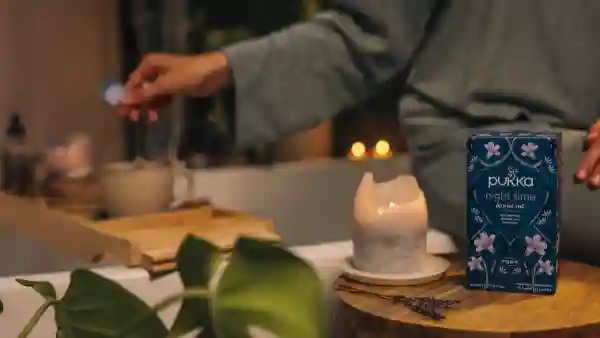

How to sleep better at night, naturally
A lack of sleep can leave the body and mind feeling exhausted, creating anxiety and stress. But even if you get to bed on time, it's not always as easy as simply closing your eyes and drifting off.
Fear not, our Senior Herbalist answers common questions about sleep, and explores little changes we can all make to our daily routine and night time rituals to help get a much better night's rest.
Work with your circadian rhythm
What is circadian rhythm?
Jo Webber, Head of Herbal education at Pukka explains that ‘your circadian rhythm is a 24-hour internal clock, running in the background of your brain and cycles between sleepiness and alertness at regular intervals.’
It’s also known as the sleep/wake cycle; it’s finely tuned to waking up when the sun rises, living a day, and going to sleep at a similar time every night, when/after the sun sets.
Your circadian rhythm works best when you have regular sleep habits and Ayurvedic advice explains that a sense of routine from one day to the next is more important for sleep than crafting the perfect combination of habits.
How can you harness it?
Wake around the same time each day, ideally around 7am.
Calm your nervous system first thing, this can be with meditation, some gentle exercise or with simple rituals like making your morning coffee or tea.
Spend some time outdoors in the morning, the light will generate melatonin, a hormone that regulates the sleep-wake cycle.
Ayurveda suggests carrying out more demanding work first thing. So if you're working get those spread sheets done first thing and have time for creativity in the afternoon.
Minimise mental activity in the evening. Try to avoid working, doing life admin or sending those long text messages/ emails just before bed.
Create a restful routine, think of little habits that can help calm the body and mind before bed. Try running a warm bath infused with epsom salts and soothing herbs, or snuggle up with a cup of Night Time tea.
When going to bed keep your room dark as this signals 'sleep time' for your circadian rhythm.
Many people believe that going to bed early is better for a good nights sleep, but what is more important is routine. Try and go to sleep and get up at the same time every day.
If you're looking to improve your nightly routine to sleep well then try our Sleep with Ease progamme. A free 7-day step by step guide to getting a better night's sleep, including helpful tips from our herbal experts, meditations and a digital sleep diary to track and monitor your progress.
Do I have a sleep problem if I wake up in the night?
We are evolutionary conditioned to wake up in the night, it's completely natural. When you do, settle your mind and try to go back to sleep.
Top tip: Meditating is a powerful way of silencing the worries rattling around in your head. Go beyond your brain’s noisy internal dialogue and enter into a more relaxed state. Try our free guided meditation.
How much sleep do I need?
This depends on a few things, the kind of person you are, how old you are and what is a normal sleep time for your family. We need an average of 7-8 hours but some people need 4 whilst others need 10. You will know what is enough for you by how refreshed you feel.
Should I completely avoid caffeine?
That’s not necessary but its probably best to not have more than two caffeinated drinks a day and none after lunch time. Matcha tea is also a great, healthy alternative for your daily coffee fix.
What sleeping remedies could I take?
Many conventional sleeping tablets for insomnia such as benzodiazepines and tricyclic anti-depressants actually inhibit REM [Rapid eye movement] sleep and should only ever be used short-term.
Natural relaxants such as plant-based teas like Pukka Herbs’ Night Time tea will help to relax a restless body and mind as well as encourage undisturbed and refreshing sleep. The key ingredients in our Night Time tea are valerian and chamomile.


What should I eat and drink to help me sleep better?
Nutritionist Cassandra Barns says: “foods rich in a natural chemical known as tryptophan can help support the body’s circadian rhythms."
"These include foods such as oats and oat flowers, walnuts, pumpkin and sunflower seeds but also natural proteins."
"Herbs that help to relax the nervous system or influence a slight sedative action can also help smooth out any residual tension left over from the day.”
Top tip: Drinking alcohol to help you sleep can actually inhibit a restful night. Try calming herbal tea blends such as Three Chamomile, Relax and Night Time in to unwind.
What exercise should I do to help me sleep better?
Celebrity personal trainer, James Stark says: “People having trouble sleeping may need to de-stress allowing their body to relax.
"I would advise avoiding too much high volume work and maybe stick to more strength-based training. Applying more yinwork would be essential so this may mean going to a good yin yoga class, taking a trip to a spa to relax or meditating.”
When is the right time to exercise?
James suggests: “Avoid doing any high intensity work late afternoon or in the evening to avoid cortisol levels increasing to high and keep the adrenals in check.
"Perform heavier/high volume workouts in first half of day (early morning is best) and leave the relaxation to the end of the day i.e. yin yoga, sauna, working on breathing techniques.

Author: Dr Vivien Rolfe
Head of Herbal Research
Viv is a gut physiologist and has recently achieved a Foundation in Herbal Medicine. She leads Pukka’s research programme to explore how herbs can benefit our health and be used to widen healthcare choices. This includes research into herbs for Women’s health and as alternatives to antibiotics. She establishes global research partnerships and enthuses the next generation of scientists through Pukka’s Scholarship Scheme. She is a champion of diversity in science and open access to knowledge.
Qualifications:
BSc, PhD, PFHEA
Years of experience:
30+ years in the wellbeing industry and academia
Education:
Degree in Physiology University of Sheffield, PhD University of Sheffield, Foundation in Herbalism Heartwood, MBA Entrepreneurship (on-going) Edinburgh Napier University, Principal Fellow of the Higher Education Academy.
Professional Registrations:
Membership of Nutrition Society, Physiological Society, Society for Chemical Industry, and other herbal and botanical groups.
